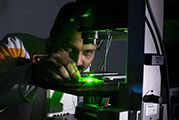Jul 25 2013
The University of Southampton’s Chemistry department has been awarded a National Chemical Landmark blue plaque by the Royal Society of Chemistry, to celebrate the 40th anniversary of the discovery of a technique that has revolutionised science.
 Dr Mahajan is using the technique to advance stem cell therapy
Dr Mahajan is using the technique to advance stem cell therapy
The technique is now used for detecting tiny quantities of molecules, in situations from crime scene forensic analysis, to drug detection, to establishing the origins of works of art.
The discovery was made in the 1970s by Professors Martin Fleischmann, Patrick Hendra and Jim McQuillan, at the University of Southampton. The team found that by roughening the metal surface upon which the molecules they were examining had been placed, they could increase the signal by which they could detect these molecules, by a million times. This allowed them to detect molecules in far smaller quantities than ever before.
Since this discovery, there have been thousands of papers published on the technique, known as Surface Enhanced Raman Spectroscopy, or SERS, as well as countless uses of it across industries and around the world. For example, it is used in forensic analysis, to pick up the tiniest traces of molecules at crime scenes.
Professor Patrick Hendra, who made the discovery in the 1970s says; "SERS is arguably the most sensitive method of analysis on surfaces that anyone has ever come up with. However, at the time we had no idea how important it would become beyond the academic world, or the vast range of applications that would be developed."
In 2013, Dr Sumeet Mahajan, Senior Lecturer in Life Science Interface at the University of Southampton is taking SERS to the next level, using the technique to advance stem cell therapy. Dr Mahajan says: “Stem cells could hold the key to tackling many diseases. They develop into all the various kinds of cells needed in the body - blood, nerves and organs - but it is almost impossible to tell them apart during initial development, without complex techniques, even with the most advanced microscopes.
“Up to now, scientists have used intrusive fluorescent ‘markers’ to track each cell, but this can alter or damage the cells and render them useless for therapeutic use. By using SERS, we can use very tiny particles of gold, less than 1000th of the width of a human hair, as ‘nanoprobes’ to enter cells. Through this, we can enhance the observation of the natural vibrations of molecules within the cell and make this otherwise almost invisible motion, easily detectable. This makes us able to detect if drugs are reaching cells correctly, and to detect abnormalities within cells on a molecular level.”
The results of Dr Mahajan’s work, funded by the Engineering and Physical Sciences Research Council (EPSRC), have been published in the influential journal Nano Letters. He is collaborating with major pharmaceutical companies to further develop the work for better drugs.
On awarding the discovery of SERS with a National Chemical Landmark blue plaque, Professor David Phillips, Royal Society of Chemistry Past President says: “I am immensely proud that my former departmental colleagues at the University of Southampton were responsible for discovering SERS, particularly since I was a member of staff in the Department when the discovery was made. The practical application of SERS in chemistry, genetics and healthcare is of vital scientific importance, from the detection of cancer genes to DNA fingerprinting. It is my great pleasure to come back to Southampton on behalf of the Royal Society of Chemistry and to present a prestigious Chemical Landmark.”
The acknowledgement of SERS’ contribution to science is being recognised on Wednesday 24 July at a symposium and plaque unveiling ceremony, where a host of pioneering scientists using SERS in the past, present and future will be in attendance.